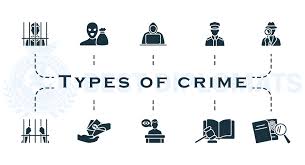The Impact of Crime on Communities
Crime is a pervasive issue that affects communities worldwide, causing harm and instilling fear among residents. The repercussions of criminal activities extend far beyond the immediate victims, impacting the social fabric, economy, and overall well-being of a community.
Social Consequences
Communities plagued by high crime rates often experience a breakdown in trust among residents. Fear of crime can lead to social isolation, as individuals become hesitant to engage with their neighbors or participate in community activities. This lack of cohesion can further exacerbate the problem, making it easier for criminals to operate without fear of detection.
Economic Impact
Crime has significant economic implications for communities. Businesses may be reluctant to invest in areas known for high crime rates, leading to a decline in economic development and job opportunities. Property values can also plummet in neighborhoods with a reputation for crime, affecting homeowners and local government tax revenues.
Psychological Effects
The psychological toll of crime on individuals within a community should not be underestimated. Victims of crime may experience trauma, anxiety, and feelings of vulnerability long after the incident has occurred. The constant threat of victimization can take a toll on mental health and overall quality of life.
Prevention and Intervention
Addressing crime requires a multifaceted approach that involves law enforcement, community organizations, and residents working together towards prevention and intervention strategies. Investing in programs that provide support to at-risk individuals, improving access to education and employment opportunities, and fostering positive relationships between law enforcement and the community are all essential steps towards creating safer neighborhoods.
In Conclusion
Crime poses a serious threat to the well-being of communities, impacting social cohesion, economic prosperity, and individual mental health. By recognizing the far-reaching consequences of criminal activities and working together to address root causes, communities can strive towards creating safer environments where all residents can thrive.
Exploring the Three Main Categories of Crime
Strategies for Monitoring Local Crime Rates and Activity
4. Defining Crime: A Distinctive Perspective
- What does means mean in crime?
- What are 3 types of crimes?
- How can I check crime in my area?
- What is the unique definition of crime?
What does means mean in crime?
In the context of crime, “means” refers to the method or instrument used by an individual to carry out a criminal act. The means employed in a crime can vary widely depending on the nature of the offense, ranging from physical tools like weapons or tools of deception such as fraud or cybercrime tactics. Understanding the means used in a crime is crucial for law enforcement and legal professionals to investigate, prosecute, and prevent criminal activities effectively.
What are 3 types of crimes?
There are various types of crimes that can be categorized based on their nature and severity. Three common categories of crimes include violent crimes, such as assault and homicide, which involve physical harm or the threat of harm to individuals; property crimes, like theft and vandalism, which involve the unlawful taking or destruction of someone else’s property; and white-collar crimes, including fraud and embezzlement, which are non-violent offenses typically committed for financial gain in a professional or business setting. Each type of crime carries its own set of legal consequences and societal impacts.
How can I check crime in my area?
To check the crime in your area, there are several resources available that provide access to local crime data. You can start by visiting your local police department’s website, where they often publish crime statistics and reports specific to different neighborhoods. Additionally, online platforms such as neighborhood watch websites, community forums, or crime mapping tools can offer valuable insights into recent criminal activities in your vicinity. It is essential to stay informed about the safety of your area and take necessary precautions to protect yourself and your community.
What is the unique definition of crime?
The unique definition of crime varies depending on the context and legal system in which it is being defined. In general, crime is commonly understood as an act that violates the law and is punishable by the state. However, what constitutes a crime can differ across jurisdictions and cultures, with some societies placing emphasis on intent or harm caused, while others focus on the violation of specific statutes. Ultimately, the definition of crime reflects the values and norms of a particular society and serves as a means to maintain order and justice within that community.

